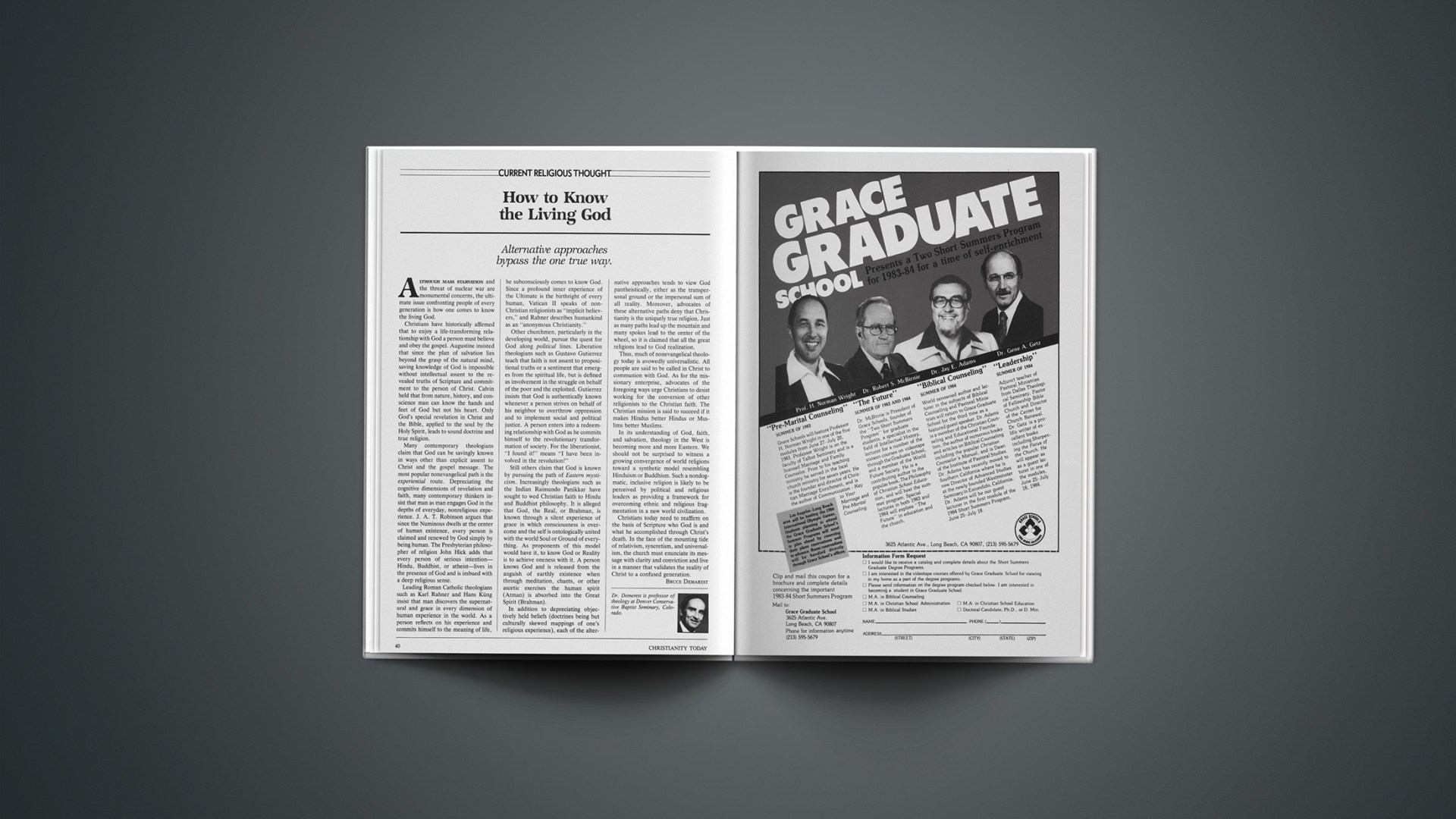Alternative approaches bypass the one true way.
Although mass starvation and the threat of nuclear war are monumental concerns, the ultimate issue confronting people of every generation is how one comes to know the living God.
Christians have historically affirmed that to enjoy a life-transforming relationship with God a person must believe and obey the gospel. Augustine insisted that since the plan of salvation lies beyond the grasp of the natural mind, saving knowledge of God is impossible without intellectual assent to the revealed truths of Scripture and commitment to the person of Christ. Calvin held that from nature, history, and conscience man can know the hands and feet of God but not his heart. Only God’s special revelation in Christ and the Bible, applied to the soul by the Holy Spirit, leads to sound doctrine and true religion.
Many contemporary theologians claim that God can be savingly known in ways other than explicit assent to Christ and the gospel message. The most popular nonevangelical path is the experiential route. Depreciating the cognitive dimensions of revelation and faith, many contemporary thinkers insist that man as man engages God in the depths of everyday, nonreligious experience. J. A. T. Robinson argues that since the Numinous dwells at the center of human existence, every person is claimed and renewed by God simply by being human. The Presbyterian philosopher of religion John Hick adds that every person of serious intention—Hindu, Buddhist, or atheist—lives in the presence of God and is imbued with a deep religious sense.
Leading Roman Catholic theologians such as Karl Rahner and Hans Küng insist that man discovers the supernatural and grace in every dimension of human experience in the world. As a person reflects on his experience and commits himself to the meaning of life, he subconsciously comes to know God. Since a profound inner experience of the Ultimate is the birthright of every human, Vatican II speaks of non-Christian religionists as “implicit believers,” and Rahner describes humankind as an “anonymous Christianity.”
Other churchmen, particularly in the developing world, pursue the quest for God along political lines. Liberation theologians such as Gustavo Gutierrez teach that faith is not assent to propositional truths or a sentiment that emerges from the spiritual life, but is defined as involvement in the struggle on behalf of the poor and the exploited. Gutierrez insists that God is authentically known whenever a person strives on behalf of his neighbor to overthrow oppression and to implement social and political justice. A person enters into a redeeming relationship with God as he commits himself to the revolutionary transformation of society. For the liberationist, “I found it!” means “I have been involved in the revolution!”
Still others claim that God is known by pursuing the path of Eastern mysticism. Increasingly theologians such as the Indian Raimundo Panikkar have sought to wed Christian faith to Hindu and Buddhist philosophy. It is alleged that God, the Real, or Brahman, is known through a silent experience of grace in which consciousness is overcome and the self is ontologically united with the world Soul or Ground of everything. As proponents of this model would have it, to know God or Reality is to achieve oneness with it. A person knows God and is released from the anguish of earthly existence when through meditation, chants, or other ascetic exercises the human spirit (Atman) is absorbed into the Great Spirit (Brahman).
In addition to depreciating objectively held beliefs (doctrines being but culturally skewed mappings of one’s religious experience), each of the alternative approaches tends to view God pantheistically, either as the transpersonal ground or the impersonal sum of all reality. Moreover, advocates of these alternative paths deny that Christianity is the uniquely true religion. Just as many paths lead up the mountain and many spokes lead to the center of the wheel, so it is claimed that all the great religions lead to God realization.
Thus, much of nonevangelical theology today is avowedly universalistic. All people are said to be called in Christ to communion with God. As for the missionary enterprise, advocates of the foregoing ways urge Christians to desist working for the conversion of other religionists to the Christian faith. The Christian mission is said to succeed if it makes Hindus better Hindus or Muslims better Muslims.
In its understanding of God, faith, and salvation, theology in the West is becoming more and more Eastern. We should not be surprised to witness a growing convergence of world religions toward a synthetic model resembling Hinduism or Buddhism. Such a nondogmatic, inclusive religion is likely to be perceived by political and religious leaders as providing a framework for overcoming ethnic and religious fragmentation in a new world civilization.
Christians today need to reaffirm on the basis of Scripture who God is and what he accomplished through Christ’s death. In the face of the mounting tide of relativism, syncretism, and universalism, the church must enunciate its message with clarity and conviction and live in a manner that validates the reality of Christ to a confused generation.
BRUCE DEMAREST1Dr. Demerest is professor of theology at Denver Conservative Baptist Seminary, Colorado.










